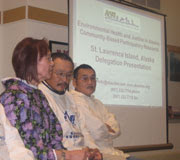Palm Sunday
Eco-Palms: A Climate-Friendly Alternative
The next day the great crowd that had come to the festival heard that Jesus was coming to Jerusalem. So they took branches of palm trees and went out to meet him, shouting “Hosanna! Blessed is the one who comes in the name of the Lord—the King of Israel!”- John 12:12-13
Harvesting palm leaves and palm products is an important source of supplemental income for many indigenous families and communities in Guatemala and Mexico. However, over-harvesting can threaten the livelihood of these communities as well as the forests where the palm trees thrive. On the global level, such deforestation in tropical regions currently accounts for about 20 percent of all climate change emissions.
Palm-producing areas in these countries are home to some of the poorer segments of rural populations. These communities rely heavily on the palm harvest for their modest income. But, although purchases of palm leaves in the U.S. may reach as high as $4.5 million each year, the palm harvesters themselves earn very little. Typically, palm harvesters are hired by local contractors, who then sell palms to large floral export firms. Payment is based on volume, motivating harvesters to gather a large number of palms without regard for their quality. This method contributes to rapid depletion of the forest's rich biodiversity, including many bird species that migrate to these regions during the winter.
Eco-Palms are harvested in a more sustainable way, paying the harvesters based on the quality of the palms they harvest rather than the quantity, which helps to limit the amount of palms taken from the forest. These communities have adopted better harvesting practices that minimize impact on the natural forest and helps to protect wild palm species.
 In Guatemala the palm harvesters have received SmartWood certification from the Rainforest Alliance. The certification is a “seal of approval” that ensures consumers the wood products they purchase come from forests managed to conserve biodiversity and support local communities. In areas where the waste ratio used to reach 50% or more, the discarded palms now count for only 5-7% of the harvested volume.
In Guatemala the palm harvesters have received SmartWood certification from the Rainforest Alliance. The certification is a “seal of approval” that ensures consumers the wood products they purchase come from forests managed to conserve biodiversity and support local communities. In areas where the waste ratio used to reach 50% or more, the discarded palms now count for only 5-7% of the harvested volume.And, rather than sending the harvested palms off to a distant warehouse for sorting and packaging, the community members complete those tasks themselves and sell their palms directly to Continental Floral, the floral company, rather than relying on middlemen. This ensures that more of the money paid for the palms actually goes to those who worked the hardest to provide them.
When done in a socially and environmentally just way, palm gathering protects valuable natural forests. Steady markets for these palms prevent the forest from being destroyed for other uses. This program is a great example of climate change mitigation and how communities can preserve natural resources for the future. The importance of forest conservation is passed along to the next generation of palm harvesters, along with the hope of a better and brighter life.
Last year alone, 644,000 palms were sold through the Eco-Palm program. It is a practical and easy way for churches in the United States to be socially conscious and help out the planet. People can collectively stand up in celebration of justice and the environment and share the jubilation of Palm Sunday with the people who harvest the palms they wave.
Lutheran World Relief is in its fifth year supporting Eco-Palms, and is now working with the Presbyterian, Methodist, and Episcopal churches on this project. To find out more about this program and how to order Eco-Palms for your congregation’s Palm Sunday service in 2011, click here.




